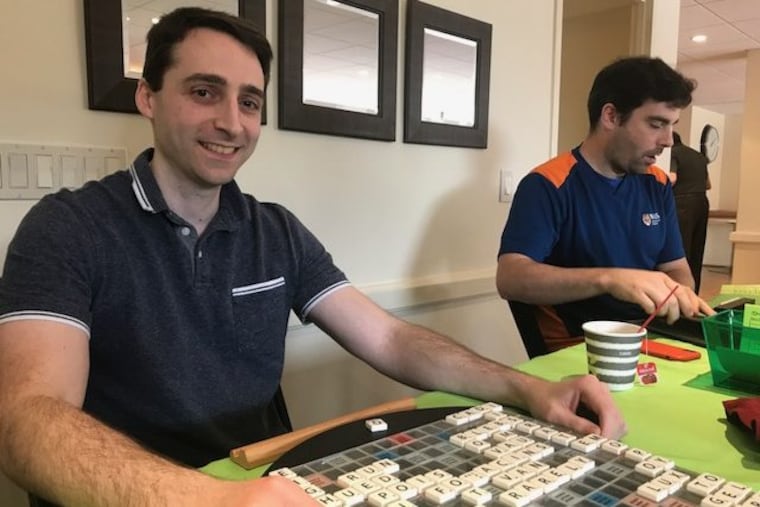Why are slurs allowed in some online Scrabble games? | The Angry Grammarian
A word-loving reader recently inquired why, when playing Scrabble on Facebook, her opponent was able to play the word JEWED — a highly offensive term for bargaining. The word doesn’t appear in her published Scrabble dictionary, and yet it was permitted by the computer.

Congratulations!
You played in this week’s North American Scrabble Championship in Reno, Nev. You know exactly how many times the letter E appears in a Scrabble set, you know all 107 two-letter words, and you know your dictionary.
But wait: Do you? If you’re using the Official Scrabble Players Dictionary published by Merriam-Webster, you’re missing hundreds of valid tournament words.
Especially the naughty ones.
A word-loving reader recently inquired why, when playing Scrabble on Facebook, her opponent was able to play the word JEWED — a highly offensive term for bargaining. The word doesn’t appear in her published Scrabble dictionary, and yet it — along with many other ethnic and racial slurs — was permitted by the computer.
Turns out that in some online versions of the game, you can choose which dictionary you play with. Though Hasbro scrubbed words that might offend a family-game audience, those words are still valid for tournaments. The result is a confusing cacophony of word lists.
“It is a bit of a mess,” said Lititz, Pa., native and 2017 tournament champ Will Anderson, on the phone while en route to Reno to compete in this year’s event. “The Scrabble app has the option to play with either of those two dictionaries.” When you begin a game, you can choose which lexicon to use: the official one published by Merriam-Webster, or the non-expurgated one managed by the North American Scrabble Players Association (NASPA). “We all agonize over it,” he added.
“NASPA has the final say as to which words go into the NASPA Word List,” said John Chew, NASPA cochair and acting chair of the organization’s dictionary committee (a committee that, be honest, you wish you were on). “Merriam-Webster has the final say as to which words go into the Official Scrabble Players Dictionary.”
In the ’90s, a Virginia player stumbled upon the realization that JEW, as a verb, was listed as valid in the second-edition Official Scrabble Players Dictionary. She initiated a letter-writing campaign, which resulted in a 1995 request from Hasbro to remove all words tagged as “offensive” from the forthcoming third edition. That included 167 slurs, swears, giggle-prompters (FART? really?), and most of the seven words you can’t say on television. (TIT, a small bird, is allowed.)
Merriam-Webster agreed, but longtime Scrabblers balked, resulting in the two separate word lists: one for the public and one for tournaments. They coexist and are correspondingly updated.
“We had lengthy discussions with Merriam-Webster before jointly deciding to add the word OK in the past year, because of controversy about whether or not it should be deemed an initialism and therefore unacceptable,” said Chew.
Because school-age kids compete in tournaments, though, conflict abounds.
“A lot of the kids cut their teeth playing in adult-level tournaments,” said Anderson, who is sometimes a commentator for kids’ competitions. When the kids play offensive words, the adults are often instructed to gloss over it as much as possible. “I remember two years ago a kid played S-P-I-C,” he said. “We didn’t say anything, and then thankfully another kid put an E on the end of it.”
Then to add to the mayhem, there’s the dictionary for overseas play, which includes the tournament words plus some internationalisms. “It's also worth noting that it is only in North America where a divide exists between full and sanitized/bowdlerized word lists,” Chew added. “The World Youth Scrabble Championships are played using an international word list that contains all of our offensive words.”
The inconsistency makes the game maddeningly different depending on who’s playing, who’s watching, even what country you’re in.
Most of the fault for the conflicting lexicons lies with Hasbro, the game makers. (Neither Hasbro nor Electronic Arts, which makes the online version of the game, responded to requests for comment.) “[Hasbro has] a large vested interest in not having words in the Scrabble dictionary that reflect poorly on their brand,” said Anderson. “It’s not a good look for them to have racial slurs in their dictionary.”
The Angry Grammarian, otherwise known as Jeffrey Barg, looks at how language, grammar, and punctuation shape our world, and appears biweekly. That’s every other week, not twice a week, friends. Send comments, questions and bingos to jeff@theangrygrammarian.com.